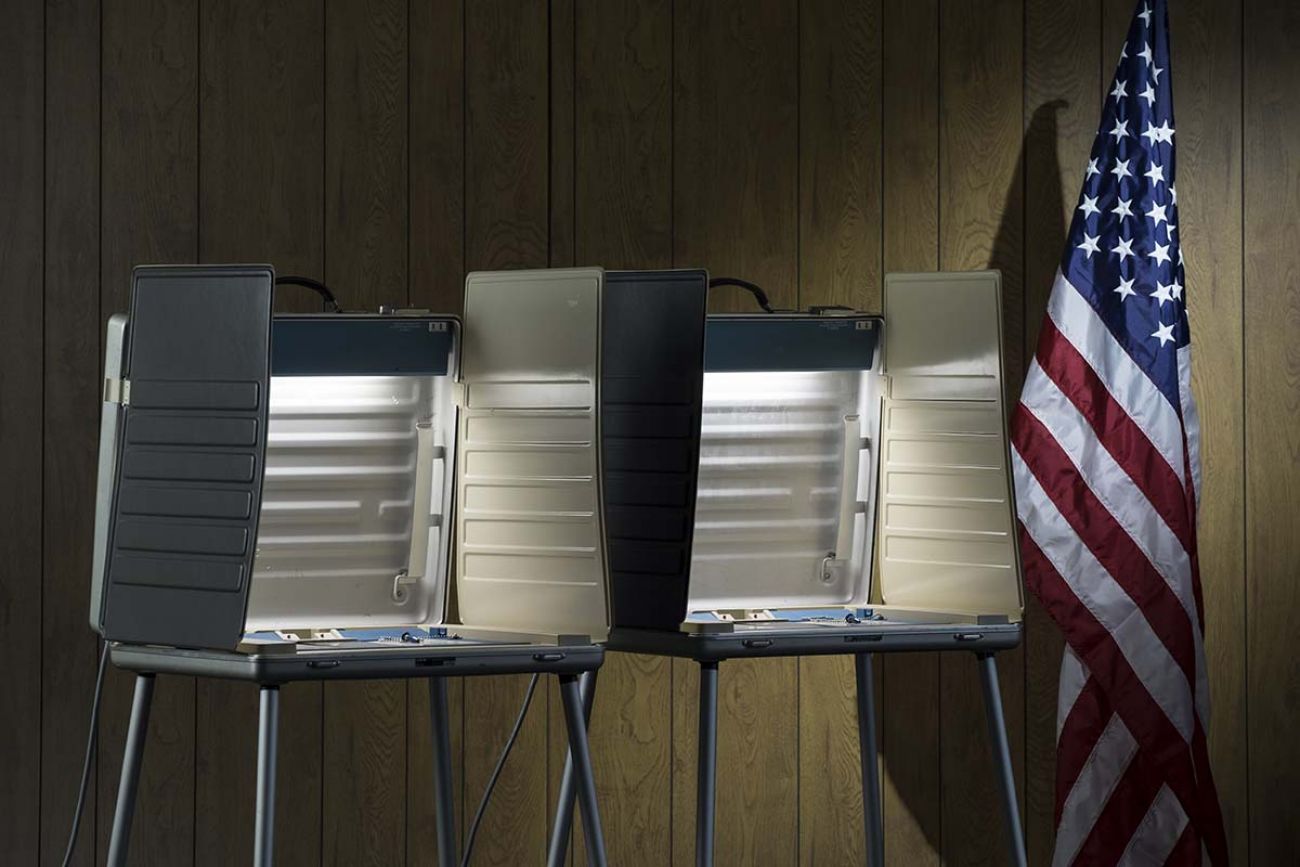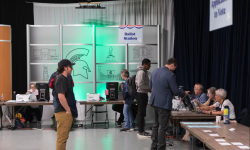Why Michigan election results won't be immediate. And why it’s not a conspiracy

Votebeat is a nonprofit news organization reporting on voting access and election administration across the U.S. Sign up for Votebeat Michigan’s free newsletter here.
In Michigan’s Wayne and Macomb counties, it’s common for several hours to pass between when polls close and when unofficial results — the ones used to call races across the country — start to come in.
With results from those two populous counties poised to determine who carries the state and wins the presidential election, what might happen during those hours has a lot of election officials and experts worried.
In 2020, as returns trickled in on election night without a declared winner in Michigan, the absence of conclusive results left a daylong information vacuum that quickly filled with mis- and disinformation driven by then-President Donald Trump and his allies. Crowds responding to their false claims created an uproar at Detroit’s vote counting center and cast doubts over the whole state’s elections.
Officials have made a number of changes since then at the local and state level to get votes counted faster, make elections more secure, and avert such commotion. Secretary of State Jocelyn Benson said earlier this week that Michigan is likely to have results within 24 hours of the polls closing.
Even so, there are several factors that could disrupt that timeline, and there is a significant chance that delays will happen again during next week’s election.
Related:
- Detroit predicting high turnout, faster count in presidential race
- In razor-thin race, watch these Michigan regions in Harris, Trump race
- Elissa Slotkin vs. Mike Rogers: What to know about Michigan’s toss-up US Senate race
If they do, experts say, misinformation is again likely to creep in and poison faith in Michigan’s elections.
“That period of uncertainty while voters wait to understand what’s happening and what the results are of an election, that is a ripe period for bad actors to point the fingers and say, ‘Look, something is wrong,’” said Nora Benavidez, senior counsel at Free Press, a nonprofit group that advocates for media’s role in democracy. “It’s at that very moment when we need to help turn down the temperature and set expectations.”
Why results take time, and what officials are doing about it
Counting ballots and tabulating unofficial results has always been a long process. In many counties, municipal clerks have to get Election Day results to the county electronically, through secure file transfers, or physically, by transporting data storage devices with the results, which can take hours.
There are also growing numbers of absentee ballots to deal with, as Michigan now offers voters the opportunity to stay permanently on the absentee list. Those ballots can take a while to process — workers must verify signatures and ensure ballot numbers match before they can put them in a tabulator.
To try to ease some of the burden, and get results reported faster, the state now allows local clerks to begin “pre-processing” absentee ballots, or getting a head start on the verification steps, as much as eight days before Election Day. They still have to wait until after polls close on Election Day to calculate the vote totals from those ballots.
The change is especially important for large jurisdictions that would otherwise need to process thousands of mailed ballots on a busy Election Day. But not every large city is taking advantage of the option.
In Warren, the third-largest city in Michigan and the largest in Macomb County, City Clerk Sonja Buffa has opted not to pre-process ballots, going against the guidance of county and state officials.
“Pre-processing is not the law,” Buffa told Votebeat. “We do everything that is mandated.”
That decision could reflect poorly on the county and the state, Macomb County Clerk Anthony Forlini warned.
“All the clerks that are doing a great job? It’ll make them look bad,” Forlini said. “The rest of the country is going to be waiting on Macomb County.”
Dorian Tyus, spokesperson for the Wayne County Clerk’s Office, said that Wayne typically has results come in slower because the county’s large population of about 1.7 million people means there are more ballots to be processed by local clerks.
Besides their size, there are other reasons Wayne and Macomb counties tend to be slower than other similar counties.
Oakland County — the second most populous in the state — uses tabulators made by Hart InterCivic, which can send unofficial results directly from the precinct tabulators to local and county clerks over a secure cellular network, said Lisa Brown, Oakland County clerk.
In communities that use other machines — Wayne uses Dominion Voting Systems, and Macomb uses machines from Election Systems & Software — that’s not an option. Communities are often permitted to send unofficial results through secure file transfers — closed computer systems that allow local clerks to send results directly to the county — which are then verified further when local clerks physically transport the results to the county clerk.
That extra step can create new problems: During the August primary, for example, Detroit struggled to submit its results electronically to Wayne County due to what officials described as a problem with a firewall. County officials had to wait for the data to be transported in person, slowing the release of countywide results by hours. By 1 a.m., almost no results were reported in Wayne County; in Detroit, results were not posted until around 7:30 a.m. the following day.
Speaking Thursday, Detroit City Clerk Janice Winfrey and Director of Elections Daniel Baxter assured the public that the city had fixed the problem and expected to have results in no later than midnight.
Beware of misinformation — unintentional and deliberate
What concerns election officials is that any delays, expected or unexpected, can fuel misinformation. Election officials at all levels have tried to combat it by better preparing voters on what to expect on Election Day — when results may be in, what the standard processes are. Not every problem can be easily explained, though, and it can be difficult to contain false information that spreads at viral speed.
Some people spread misinformation unintentionally, Benavidez said, because they get caught up in the moment and the emotion tied to it. Elections can make people feel particularly vulnerable, she said.
But plenty of people deliberately spread things that are provably untrue, to advance a point of view or campaign.
“There are those who are seeking to warp people’s perception of reality, to weaponize the democratic process, and seek political power. We’ve seen this in other countries,” Benavidez said, adding that such distortions can be a precursor to authoritarianism.
“Those who promote false claims are often doing it for their own political gain or for money,” she said.
In 2020, misinformation led hundreds of Trump supporters to protest at the convention hall now known as Huntington Place, where Detroit poll workers were counting votes on election night. Spurred on by a candidate who falsely claimed that “ballot dumps” were costing him the election, they demanded to be let in to serve as challengers and watchers, even though many accredited Republicans were already serving in those roles. And when they were denied entry, they pounded on the windows of the room where counting was happening, menacing poll workers and demanding that the count be stopped.
Steps to speed up results depend on communities participating
Michigan has since enacted a variety of laws to prevent such messes. In addition to expanding pre-processing of absentee ballots, it has guaranteed access to early voting, giving voters across the state at least nine additional days to cast their ballots in person.
All the changes aim to make elections smoother and bring in results faster, which is partly why Buffa’s decision to not pre-process ballots in Warren has drawn so much ire.
Buffa told Votebeat that she has been a clerk for 24 years, which has covered seven presidential elections. At this point, she said, she’s not willing to do anything that’s “not comfortable.”
Warren, home to just under 140,000 people, is by far the largest community that’s not pre-processing absentee ballots. Nearly 28,000 Warren voters have requested absentee ballots, according to the state’s dashboard. As of Thursday, more than 19,500 voters had already returned them, putting Warren in the top 10 cities across the state for returned absentee ballots.
Benson confirmed that 245 jurisdictions across the state would be pre-processing in some way, adding that her office reached out to Buffa to offer support.
“I would hope every clerk take advantage of every option to ensure efficiency, security, and accuracy when processing and tabulating their votes,” Benson said.
“If there is one community that is lagging behind others, and it’s Warren,” she added later, “we’ll be open about that, so we can make sure everyone knows exactly what’s happening.”
Amy Cohen, executive director of the National Association of State Election Directors, said that the problem with any sort of delay is that despite broad changes to voting practices in recent elections, many Americans still expect results the same night. That largely stems from a time when elections had wider margins, she said.
When margins are much closer — like Joe Biden’s 2.8-percentage-point win in Michigan in 2020 — national news outlets that typically project winners wait until they have a high level of confidence in the results. Most people don’t have the deeper understanding of elections that helps explain why results take so long or how ballots are processed, Cohen said, and people “sort of filled in the blanks” in 2020 when they didn’t have other information to go on.
What should people conclude if results are taking longer than they’d like?
“Any delay is a result of election officials tabulating every eligible ballot,” Cohen said. “It’s the opposite of a security concern.”
Hayley Harding is a reporter for Votebeat based in Michigan. Contact Hayley at hharding@votebeat.org.
See what new members are saying about why they donated to Bridge Michigan:
- “In order for this information to be accurate and unbiased it must be underwritten by its readers, not by special interests.” - Larry S.
- “Not many other media sources report on the topics Bridge does.” - Susan B.
- “Your journalism is outstanding and rare these days.” - Mark S.
If you want to ensure the future of nonpartisan, nonprofit Michigan journalism, please become a member today. You, too, will be asked why you donated and maybe we'll feature your quote next time!





